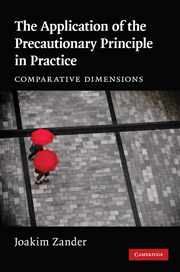Book contents
- Frontmatter
- Contents
- Acknowledgements
- Abbreviations
- Table of Cases
- Table of Legislation
- EU Legislation and Soft Law
- Swedish Legislation, preparatory work, etc.
- United Kingdom
- United States of America
- 1 Introduction
- 2 Risk and uncertainty: basic concepts and tools for the application of the precautionary principle
- 3 The precautionary principle in international law
- 4 The precautionary principle in EU law
- 5 The precautionary principle in Sweden
- 6 The precautionary principle in the United Kingdom
- 7 The precautionary principle in the United States
- 8 Conclusions
- Bibliography
- Index
8 - Conclusions
Published online by Cambridge University Press: 17 November 2010
- Frontmatter
- Contents
- Acknowledgements
- Abbreviations
- Table of Cases
- Table of Legislation
- EU Legislation and Soft Law
- Swedish Legislation, preparatory work, etc.
- United Kingdom
- United States of America
- 1 Introduction
- 2 Risk and uncertainty: basic concepts and tools for the application of the precautionary principle
- 3 The precautionary principle in international law
- 4 The precautionary principle in EU law
- 5 The precautionary principle in Sweden
- 6 The precautionary principle in the United Kingdom
- 7 The precautionary principle in the United States
- 8 Conclusions
- Bibliography
- Index
Summary
Since its inclusion in the Treaty of Maastricht in 1992 and, in particular, since the food scares of the last years of the 1990s, the precautionary principle has been held up as a fundamental principle of environmental and health regulation in the EU. Frequent reference is made to the precautionary principle, both in relation to the internal market and in international trade relations. In a European Union which is increasingly concerned with the negative effects of human development and economic progress, a legal instrument which allows for early intervention is generally perceived as necessary and reasonably uncontroversial.
However, this book has shown that the use of the precautionary principle, by the EU institutions as well as by the Member States, is far from uncontroversial. Similar situations are not treated in a comparable fashion, which makes it increasingly difficult to foresee how and when precautionary measures will be applied, and it is often difficult for the affected parties to enjoy effective redress before the relevant courts. Furthermore, EU Member States increasingly justify derogation not only from harmonised rules but also from the basic free movement provisions by invoking the precautionary principle. This practice runs the risk of undermining the careful compromises and agreements which underlie the EU, and, as a consequence, a fragmentation of the internal market.
This book has analysed whether it is possible to discern a definition of the precautionary principle, as well as whether there are systematic and coherent elements behind the issuing of precautionary measures at international, European and national levels.
Information
- Type
- Chapter
- Information
- The Application of the Precautionary Principle in PracticeComparative Dimensions, pp. 327 - 348Publisher: Cambridge University PressPrint publication year: 2010
